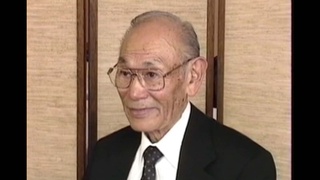Interviews
The hardships of life in Japan during World War II
Well, of course, the Japanese life was so different. The weather was so different. And I came down with a -- it was, I think, within a year -- I came down with pleurisy and it's called the wet serous, I mean, I had a lot of water collect in my pleura. And the doctors were scarce but anyway, I was hardly able to breathe. And I remember I totally lost, lost my appetite. I wasn't eating, my mother was really concerned. And the doctor did come to draw some serous fluid from my pleura and it kinda helped me breathe. But everything was black market. You couldn't buy an egg, you couldn't buy food, even if you had the money. We didn't have the money, but even if you had the money you couldn't buy.
So, I remember my mother came back and with her hachimaki (headband) she had this one egg cradled in her hachimaki and she says, Marion, Marion, look what I found, look what I got you. (When I was well), I could eat, sit down and eat three eggs at one sitting, but here, this precious egg, she was so proud, she was, she got this egg for me. She said, How do you want me to prepare it for you? Boiled egg, soft boiled egg, fried egg? And I didn't even want that.
So I thought, you know, I mean, these are the loving thoughts that you just... I haven't forgotten. Well, I, I'm, I don't know how it ended up being, but anyway, I remember that that's how scarce food items were.
Date: August 3 & 4, 2003
Location: Washington, US
Interviewer: Alice Ito
Contributed by: Denshō: The Japanese American Legacy Project.





